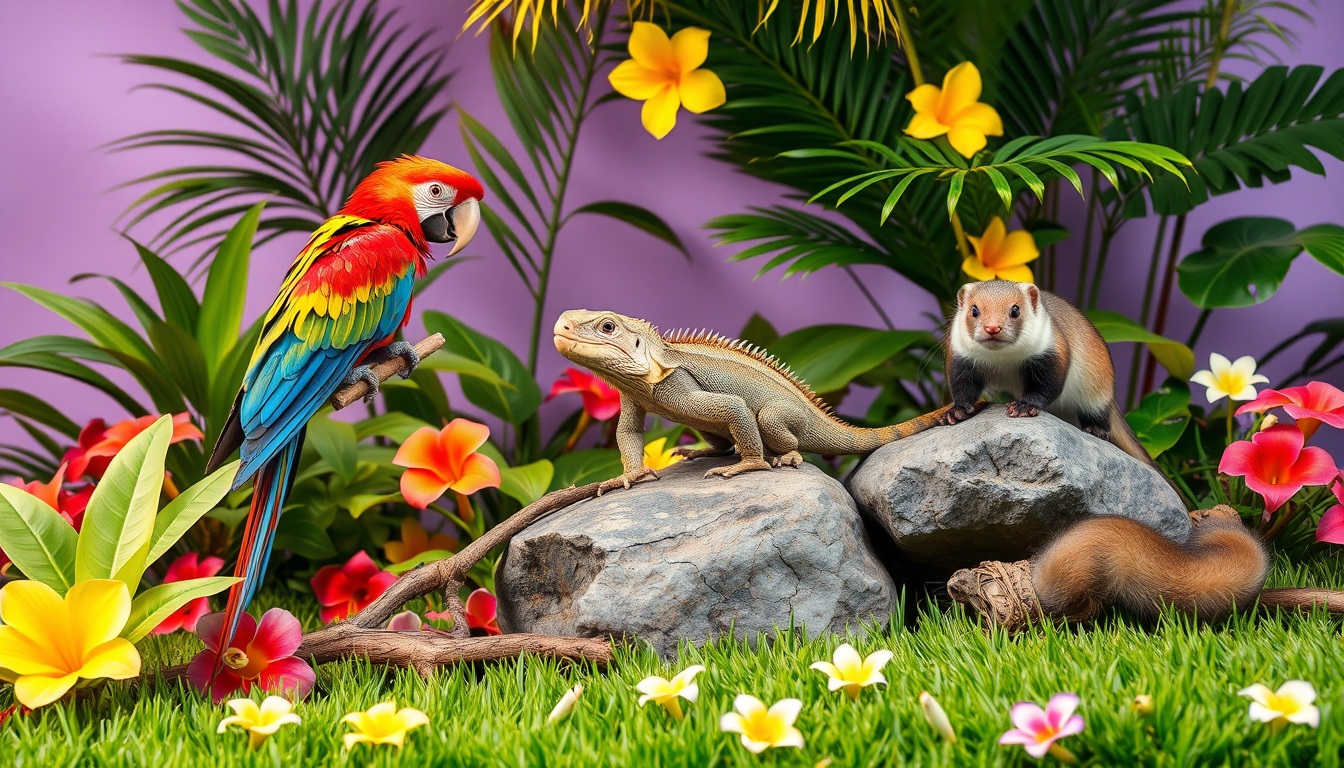Are you considering welcoming an exotic pet into your home, or do you already have one that needs a little extra TLC?
Exotic pet care is a fascinating yet nuanced responsibility that goes beyond the basics of caring for traditional pets like cats and dogs.
From reptiles and birds to small mammals and amphibians, each type of exotic pet comes with unique needs and care requirements that are essential for keeping them happy and healthy.
In this ultimate guide, we’ll dive deep into the world of exotic pets, offering valuable tips and insights that will empower you to provide the best care possible for your unique companions.


Proper Nutrition for Exotic Pets: What You Need to Know
When it comes to exotic pet care, proper nutrition is paramount for ensuring your unique companion thrives.
Unlike typical pets like dogs and cats, exotic animals often have specialized dietary needs that reflect their natural habitats.
For instance, reptiles often require a diet rich in insects or specific vegetables, while birds might thrive on seeds and fruits.
It’s crucial to research the specific dietary requirements of your exotic pet, as feeding them the wrong foods can lead to serious health issues.
Furthermore, always make sure to provide fresh water and consult with a veterinarian who specializes in exotic animals to create a balanced diet.
Understanding what your exotic pet needs nutritionally not only enhances their well-being but also strengthens the bond you share with them.
Regular Health Check-ups and Preventative Care
When it comes to exotic pet care, one of the most crucial aspects that often gets overlooked is the importance of regular health check-ups and preventative care.
Just like cats and dogs, exotic pets such as reptiles, birds, and small mammals require routine veterinary visits to ensure they are healthy and thriving.
These check-ups can help catch potential health issues early, which is essential since many exotic pets can mask signs of illness.
Regular screenings can include vaccinations, dental checks, and parasite screenings, tailored to the unique needs of each species.
By prioritizing these health visits, you not only enhance the quality of life for your exotic companion but also deepen the bond you share with them, knowing you’re providing the best care possible.
Frequently Asked Questions
What are some common exotic pets and their specific care needs?
Common exotic pets include reptiles like snakes and lizards, birds such as parrots and finches, and small mammals like hedgehogs and sugar gliders.
Each type has unique needs; for example, reptiles require specific temperature and humidity levels, while birds may need social interaction and mental stimulation.
How can I create a healthy living environment for my exotic pet?
Creating a healthy living environment involves several factors: ensuring the appropriate habitat size and setup, using suitable bedding and decorations that mimic their natural habitat, and maintaining proper temperature and humidity levels.
Regular cleaning and a quiet space can also help reduce stress.
What should I consider when selecting food for my exotic pet?
Proper nutrition for exotic pets varies widely depending on the species.
It’s essential to research the specific dietary requirements for your pet, which may include live insects for reptiles, pellets and fresh fruits for rodents, or specialized diets for birds.
Always consult a vet experienced in exotic animal care.
How often should I take my exotic pet for a health check-up?
Regular health check-ups for exotic pets depend on the species and individual health, but generally, it’s advisable to have a veterinary check-up at least once a year.
Young or newly adopted pets may need more frequent visits for vaccinations and assessments.
What types of training and enrichment activities can I do with my exotic pet?
Training and enrichment can include teaching commands or tricks (especially for birds and small mammals), providing foraging opportunities, interactive toys, and creating obstacle courses.
These activities help stimulate their minds and keep them physically active, leading to a happier and healthier pet.
[center][/center]
[center][color=rgb(10, 10, 10)][highlight=rgb(255, 248, 231)] [/highlight][/color][color=rgb(10, 10, 10)][highlight=rgb(255, 248, 231)]As an Amazon Affiliate,[/highlight][/color][color=rgb(10, 10, 10)][highlight=rgb(255, 248, 231)] [/highlight][/color][color=rgb(10, 10, 10)][highlight=rgb(255, 248, 231)]Savvy Keto makes a commission[/highlight][/color][color=rgb(10, 10, 10)][highlight=rgb(255, 248, 231)] [/highlight][/color][color=rgb(10, 10, 10)][highlight=rgb(255, 248, 231)](at no extra cost to you)[/highlight][/color][color=rgb(10, 10, 10)][highlight=rgb(255, 248, 231)] [/highlight][/color][color=rgb(10, 10, 10)][highlight=rgb(255, 248, 231)]on purchases you make[/highlight][/color][color=rgb(10, 10, 10)][highlight=rgb(255, 248, 231)] [/highlight][/color][color=rgb(10, 10, 10)][highlight=rgb(255, 248, 231)]thru links on this site.[/highlight][/color][/center]

